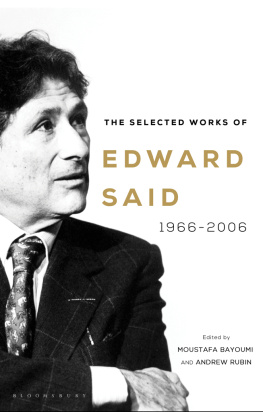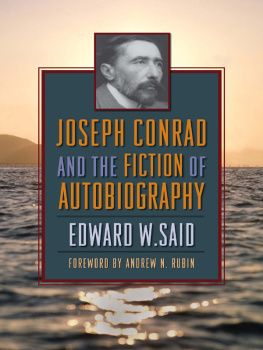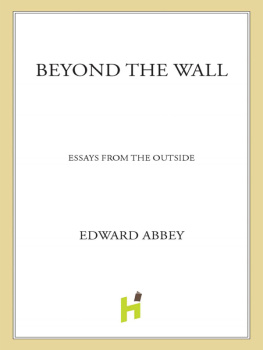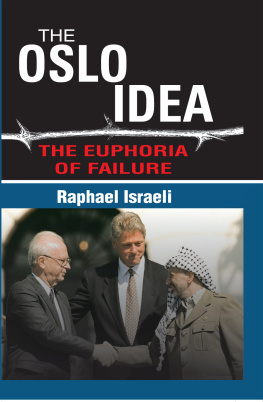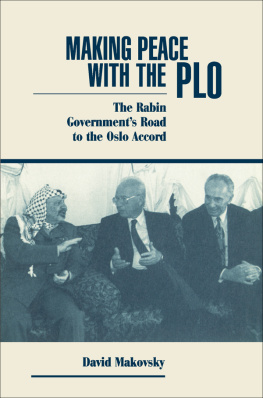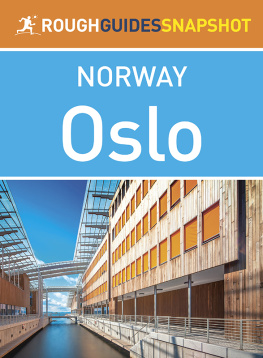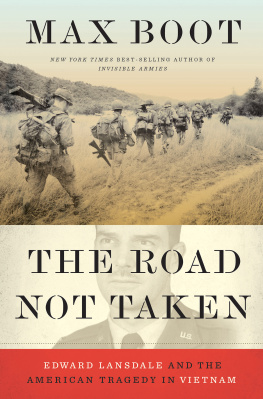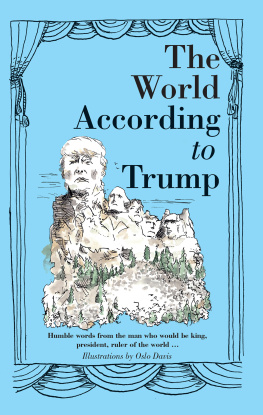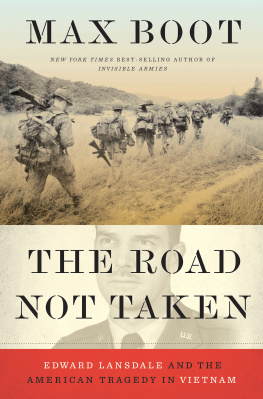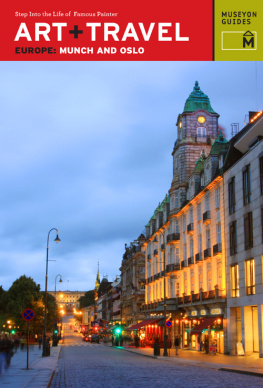Edward Said - From Oslo to Iraq and the Road Map: Essays
Here you can read online Edward Said - From Oslo to Iraq and the Road Map: Essays full text of the book (entire story) in english for free. Download pdf and epub, get meaning, cover and reviews about this ebook. year: 2007, publisher: Vintage, genre: Politics. Description of the work, (preface) as well as reviews are available. Best literature library LitArk.com created for fans of good reading and offers a wide selection of genres:
Romance novel
Science fiction
Adventure
Detective
Science
History
Home and family
Prose
Art
Politics
Computer
Non-fiction
Religion
Business
Children
Humor
Choose a favorite category and find really read worthwhile books. Enjoy immersion in the world of imagination, feel the emotions of the characters or learn something new for yourself, make an fascinating discovery.

- Book:From Oslo to Iraq and the Road Map: Essays
- Author:
- Publisher:Vintage
- Genre:
- Year:2007
- Rating:4 / 5
- Favourites:Add to favourites
- Your mark:
- 80
- 1
- 2
- 3
- 4
- 5
From Oslo to Iraq and the Road Map: Essays: summary, description and annotation
We offer to read an annotation, description, summary or preface (depends on what the author of the book "From Oslo to Iraq and the Road Map: Essays" wrote himself). If you haven't found the necessary information about the book — write in the comments, we will try to find it.
Edward Said: author's other books
Who wrote From Oslo to Iraq and the Road Map: Essays? Find out the surname, the name of the author of the book and a list of all author's works by series.
From Oslo to Iraq and the Road Map: Essays — read online for free the complete book (whole text) full work
Below is the text of the book, divided by pages. System saving the place of the last page read, allows you to conveniently read the book "From Oslo to Iraq and the Road Map: Essays" online for free, without having to search again every time where you left off. Put a bookmark, and you can go to the page where you finished reading at any time.
Font size:
Interval:
Bookmark:
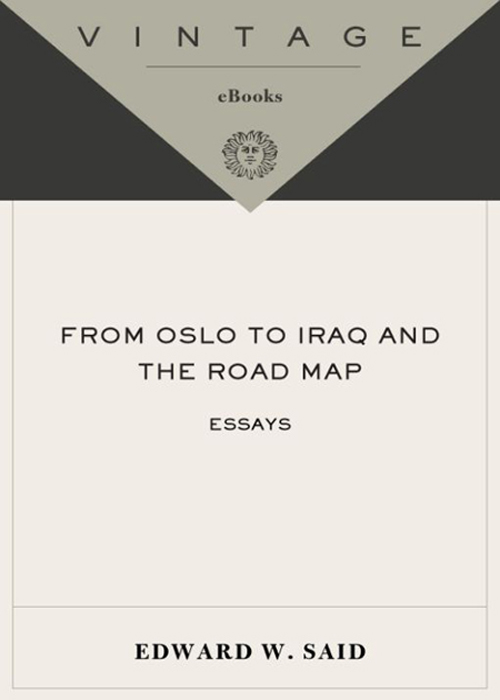
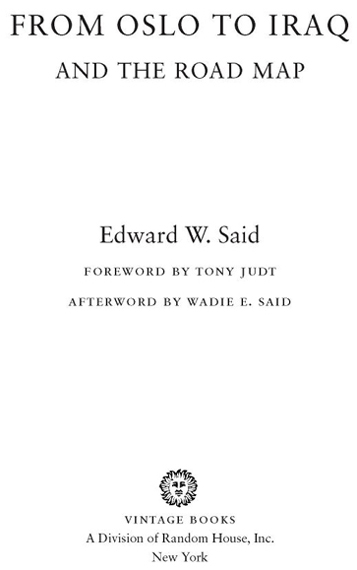
Table of Contents
FOREWORD
When Edward Said died in September 2003, after a decade-long battle against leukemia, he was probably the best-known intellectual in the world. Orientalism, his controversial account of the appropriation of the East in modern European thought and literature, has spawned an academic subdiscipline in its own right: a quarter of a century after its first publication it continues to generate irritation, veneration, and imitation. Even if its author had done nothing else, confining himself to teaching at Columbia University in New Yorkwhere he was employed from 1963 until his deathhe would still have been one of the most influential scholars of the late twentieth century.
But he did not confine himself. From 1967, and with mounting urgency and passion as the years passed, Edward Said was also an eloquent, ubiquitous commentator on the crisis in the Middle East and an advocate for the cause of the Palestinians. This moral and political engagement was not really a displacement of Saids intellectual attentionhis critique of the Wests failure to understand Palestinian humiliation closely echoes, after all, his reading of nineteenth-century scholarship and fiction in Orientalism and subsequent books (notably Culture andImperialism, published in 1993). But it transformed the professor of comparative literature at Columbia into a very public intellectual, adored or execrated with equal intensity by many millions of readers.
This was an ironic fate for a man who fitted almost none of the moulds to which his admirers and enemies so confidently assigned him. Edward Said lived all his life at a tangent to the various causes with which he was associated. The involuntary spokesman for the overwhelmingly Moslem Arabs of Palestine was an Episcopalian Christian, born in 1935 to a Baptist from Nazareth. The uncompromising critic of imperial condescension was educated in some of the last of the colonial schools that had trained the indigenous elite of the European Empires; for many years he was more at ease in English and French than in Arabic and an outstanding exemplar of a Western education with which he could never fully identify.
Edward Said was the idolized hero of a generation of cultural relativists in universities from Berkeley to Bombay, for whom orientalism underwrote everything from career-building exercises in post-colonial obscurantism (writing the other) to denunciations of Western Culture in the academic curriculum. But Said himself had no time for such nonsense. Radical anti-foundationalism, the notion that everything is just a linguistic effect, struck him as shallow and facile: human rights, as he observed on more than one occasion, are not cultural or grammatical things, and when violated they are as real as anything we can encounter.
As for the popular account of his thought which has Edward Said reading (Western) writers as mere by-products of colonial privilege, he was quite explicit: I do not believe that authors are mechanistically determined by ideology, class, or economic history. Indeed, when it came to the business of reading and writing Said was an unabashedly traditional humanist, despite the scornful dismissal of the term by sophisticated post-modern critics. If there was anything that depressed him about younger literary scholars it was their over familiarity with theory at the expense of the art of close textual reading. Moreover, he enjoyed intellectual disagreement, seeing the toleration of dissent and even discord within the scholarly community as the necessary condition for the latters survivalmy own expressed doubts about the core thesis of Orientalism were no impediment to our friendship. This was a stance that many of his admirers from afar, for whom academic freedom is at best a contingent value, were at a loss to comprehend.
This same, deeply felt humanistic impulse put Edward Said at odds with another occasional tic of engaged intellectuals, the enthusiastic endorsement of violenceusually at a safe distance and always at someone elses expense. The Professor of Terror, as his enemies were wont to characterize Said, was in fact a consistent critic of political violence in all its forms. Unlike Jean-Paul Sartre, a comparably influential intellectual for the previous generation, Said had some firsthand experience of physical forcehis university office was vandalized and sacked, and both he and his family received death threats. But whereas Sartre did not hesitate to advocate political murder as both efficacious and cleansing, Said never identified with terrorism, however much he sympathized with the motives and sentiments that drove it. The weak, he wrote, should use means that render their oppressors uncomfortablesomething that indiscriminate murder of civilians can never achieve.
The reason for this was not that Edward Said was placid or a pacifist, much less someone lacking in strong commitments. Notwithstanding his professional success, his passion for music (he was an accomplished pianist, a close friend and sometime collaborator of Daniel Barenboim), and his gift for friendship, he was in certain ways a deeply angry manas the essays in this book frequently suggest. But despite his identification with the Palestinian cause and his inexhaustible efforts to promote and explain it, Said quite lacked the sort of un-interrogated affiliation to a country or an idea that allows the activist or the ideologue to subsume any means to a single end.
Instead he was, as I suggested, always at a slight tangent to his affinities. In this age of displaced persons he was not even a typical exile, since most men and women forced to leave their country in our time have a place to which they can look back (or forward): a rememberedmore often mis-rememberedhomeland that anchors the transported individual or community in time if not in space. Palestinians dont even have this. There never was a formally-constituted Palestine, and Palestinian identity thus lacks that conventional anterior reference.
In consequence, as Said tellingly observed just a few months before his death, I still have not been able to understand what it means to love a country. That, of course, is the characteristic condition of the rootless cosmopolitan. It is not very comfortable or safe to be without a country to love: it can bring down upon your head the anxious hostility of those for whom such rootlessness suggests a corrosive independence of spirit. But it is liberating: the world you look out upon may not be as reassuring as the vista enjoyed by patriots and nationalists, but you see further. As Said wrote in 1993, I have no patience with the position that we should only or mainly be concerned with what is ours.
This is the authentic voice of the independent critic, speaking the truth to power... and supplying a dissenting voice in conflicts with authority: as Said wrote in Al-Ahram in May 2001, whether Israeli intellectuals have failed or not in their mission is not for us to decide. What concerns us is the shabby state of discourse and analysis in the Arab world. It is also the voice of the free-standing New York intellectual, a species now fast approaching extinctionthanks in large measure to the same Middle Eastern conflict in which so many have opted to take up sides and identify with us and ours. Edward Said, as the reader of these essays will discover, was by no means a conventional spokesman for one party in that conflict.
Next pageFont size:
Interval:
Bookmark:
Similar books «From Oslo to Iraq and the Road Map: Essays»
Look at similar books to From Oslo to Iraq and the Road Map: Essays. We have selected literature similar in name and meaning in the hope of providing readers with more options to find new, interesting, not yet read works.
Discussion, reviews of the book From Oslo to Iraq and the Road Map: Essays and just readers' own opinions. Leave your comments, write what you think about the work, its meaning or the main characters. Specify what exactly you liked and what you didn't like, and why you think so.

